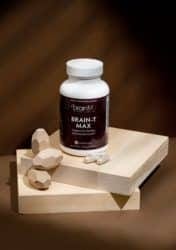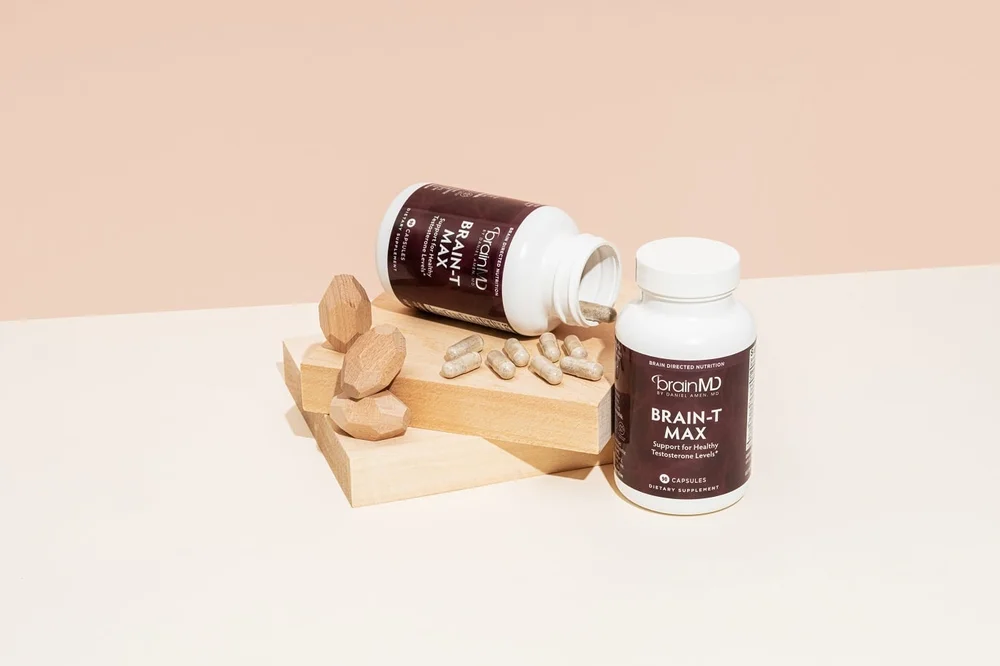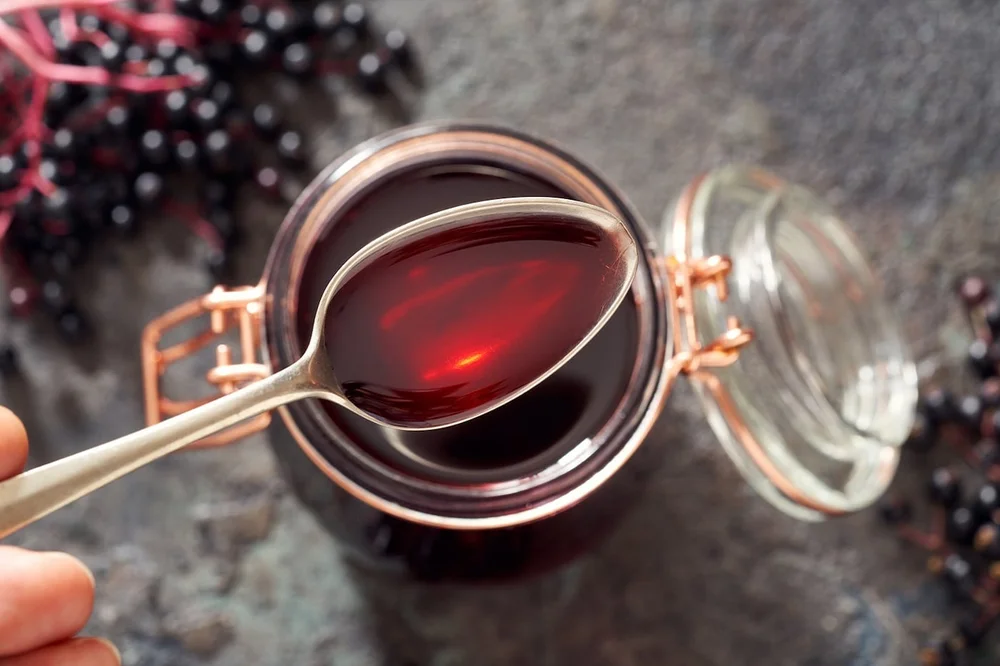Ask Dr. Avena: An Interview With Our CSO On The Benefits Of Testosterone
Dr. Nicole Avena, our Chief Science Officer, has a PhD in neuroscience and psychology from Princeton University and an expertise in brain health and nutrition. Today, we’re picking her brain on the benefits of testosterone supplements, getting the answers to your most pressing questions, and diving deep into the science behind Brain-T MAX, BrainMD’s new testosterone supplement.
Brain-T MAX Testosterone Supplement: Interview With Brain Health Expert, Dr. Nicole Avena
BrainMD: What does testosterone do?
Dr. Nicole Avena: Testosterone is a sex hormone that both men and women need, but as we age it tends to decline. Supporting healthy testosterone levels can help an individual’s vitality, cognitive function, immune health, and overall wellness.
BrainMD: Speaking of cognitive function, what’s the connection between brain health and testosterone?
Dr. Avena: Testosterone is an important modulator of cerebral functions and plays a role in cognition. Low testosterone levels have been associated with an increased risk of cognitive impairment, so supporting healthy testosterone levels may help enhance mood and cognitive function in aging men with reduced testosterone.
BrainMD: Research shows that testosterone is declining in the U.S. In fact, in the last two decades, testosterone levels in men have fallen over 50%. How common is low testosterone in men?
Dr. Avena: Testosterone peaks in men at around age 18, and after age 30, it decreases by 1% a year. So if you’re not a teenager anymore, your testosterone levels are already falling.
BrainMD: What causes low testosterone?
Dr. Avena: The process of aging can cause decreased levels of testosterone production. Testosterone levels typically peak during adolescence. Once this peak hits, testosterone production gradually declines by around 1% per year. Due to the decline in testosterone that can be experienced, those affected may experience changes in sexual function, physical changes, and emotional changes.
Other conditions associated with low testosterone include:
- Injury (trauma, interrupted blood supply to the testes) or infection of the testes (orchitis)
- Chemotherapy
- Metabolic disorders such as hemochromatosis (too much iron in the body)
- Dysfunction or tumors of the pituitary gland
- Certain medications
- Alcohol abuse
- Chronic renal (kidney) failure
- Inflammatory conditions such as sarcoidosis (a condition that causes inflammation of the lungs and other organs)
- Kallman syndrome (abnormal development of the hypothalamus, a gland in the brain that controls many hormones)
- Obesity or extreme weight loss
- Uncontrolled type 2 diabetes mellitus
- Obstructive sleep apnea
- Estrogen excess (usually from an external or environmental source)
- Previous anabolic steroid abuse
- Severe primary hypothyroidism
- Pubertal delay
- Trauma (head injury)
- Radiation exposure or prior surgery of the brain
BrainMD: How do you know if you have low testosterone? What are the symptoms?
Dr. Avena: Low testosterone is diagnosed with a blood test. Since testosterone levels vary throughout the day, it may take several measurements to determine if someone has low testosterone.
Symptoms of low testosterone may include:
- Low sex drive
- Low mood
- Erectile dysfunction
- Decreased sense of well-being
- Difficulties with concentration and memory
- Fatigue
- Moodiness and irritability
- Loss of muscular strength
- Fertility problems
- Increased body fat
BrainMD: Should women also be concerned about low testosterone?
Dr. Avena: Testosterone isn’t just a “male hormone.” It’s also critical for cognitive function, fertility, mood, metabolism, bone density, and cardiovascular health. Many people wrongly think that testosterone is a male hormone. But women need testosterone too, just at lower levels. Healthy testosterone levels in women support sex drive, menstrual health, fertility, breast and vaginal health, bone density, and muscle mass.
Just like men, women’s testosterone levels decrease over time, especially once they hit menopause. The #1 complaint of women with low testosterone typically is decreased libido, which is why so many women are searching for libido supplements.
BrainMD: How does Brain-T MAX support healthy testosterone levels?

Fenugreek has been shown in various studies to have an androgenic and anabolic effect in the male body. Different parts of the fenugreek plant have been used as herbs, spices, and vegetables; it has also been certified in its seed extract form by the USDA. Fenugreek has been shown in studies to increase overall total serum testosterone. In one study, the administration of 500 mg of fenugreek seed extract in college-aged men led to an overall increase in testosterone and a decrease in the enzymes that inhibit the metabolism of testosterone.1
Ashwagandha is widely utilized as an herb that helps to support a healthy stress response and has been known to decrease cortisol levels. It has also been used to treat sexual weakness and dysfunction in men. Studies surrounding the effects of ashwagandha on the male body have been found to increase serum testosterone levels while decreasing both follicle hormone and luteinizing hormone.2
Tongkat ali is an herbal shrub that is found in various rainforest settings. Due to the active components found within tongkat ali, it has been shown in studies to increase overall serum testosterone levels.3
Zinc is a micronutrient that many individuals in the United States are deficient in. Research has found a positive correlation between the body’s zinc concentrations and testosterone levels. Zinc deficiency has been associated with decreased serum testosterone levels. Overall, zinc seems to be an important determinant of healthy serum testosterone levels.4
BrainMD: What makes Brain T-MAX different from other testosterone products?
Dr. Avena: Brain-T MAX is an expertly researched formula that took years to develop. This unique combination of Testofen® – the world’s most clinically-researched fenugreek seed extract – KSM-66® ashwagandha, LJ100® tongkat ali, and zinc, is the first of its kind. It uses all natural herbs to benefit your endocrine system. Unlike other supplements, the product is gluten free and free of artificial colors and flavors. Brain-T MAX targets the source of common sexual health issues that come with aging to help support your overall well-being, stress levels, and immunity.
BrainMD: Beyond taking Brain T-MAX consistently, what do you suggest women and men do to support hormone health and healthy testosterone?
Dr. Avena: To support hormone health and healthy testosterone, you should:
- Improve sleep
- Eat a nutrient-rich diet with minimal amounts of processed foods
- Avoid using endocrine disruptors (synthetic soaps and shampoos, food colorants, plastic cookware and containers, synthetic deodorants, etc.)
- Improve thyroid health
- Lower stress
- Make sure you’re getting enough vitamin D and magnesium
- Exercise regularly
BrainMD: What other supplements would make Brain-T MAX work even better?
Dr. Avena: Pairing Brain-T MAX with Brain & Memory Power Boost will support your overall body in the aging process. Brain & Memory Power Boost helps keep your brain healthy, while Brain-T MAX supports hormonal regulation. Supporting both your brain and endocrine system during aging is essential.
Thank you, Dr. Avena! Is there a question we haven’t answered? Please share it in the comments.
At BrainMD, we’re dedicated to providing the highest purity nutrients and standardized herbal ingredients to support your overall well-being. For more information about Brain-T MAX and our full list of supplements, please visit us at BrainMD.
Scientific References:
- Mansoori A, Hosseini S, Zilaee M, Hormoznejad R, Fathi M. Effect of fenugreek extract supplement on testosterone levels in male: A meta-analysis of clinical trials. Phytother Res. 2020;34(7):1550-1555. doi:10.1002/ptr.6627.
- Dongre S, Langade D, Bhattacharyya S. Efficacy and Safety of Ashwagandha (Withania somnifera) Root Extract in Improving Sexual Function in Women: A Pilot Study. Biomed Res Int. 2015;2015:284154. doi:10.1155/2015/284154.
- Henkel RR, Wang R, Bassett SH, et al. Tongkat Ali as a potential herbal supplement for physically active male and female seniors–a pilot study. Phytother Res. 2014;28(4):544-550. doi:10.1002/ptr.5017.
- Prasad AS, Mantzoros CS, Beck FW, Hess JW, Brewer GJ. Zinc status and serum testosterone levels of healthy adults. Nutrition. 1996;12(5):344-348. doi:10.1016/s0899-9007(96)80058-x
- Unlock The Secrets Of A Healthy Brain: 10 Takeaways From The Latest Genius Webinar With Dr. Amen - August 18, 2023
- Are Protein Bars Good For Your Brain & Body? We Asked A Nutrition Expert To Weigh In - November 4, 2022
- What’s Inside Vegan Omega-3 Power? Learn From Our Formulators About Pure Algae Omega-3s! - August 12, 2022




Can someone have too MUCH testosterone? If so, what are those symptoms and how would they go about decreasing it safely?
How is the dosage different from men and women?
Is the dosage for Brain T Max the same for women as for men? It was previously stated women just need a lower dose, so I’m confused. Thanks!